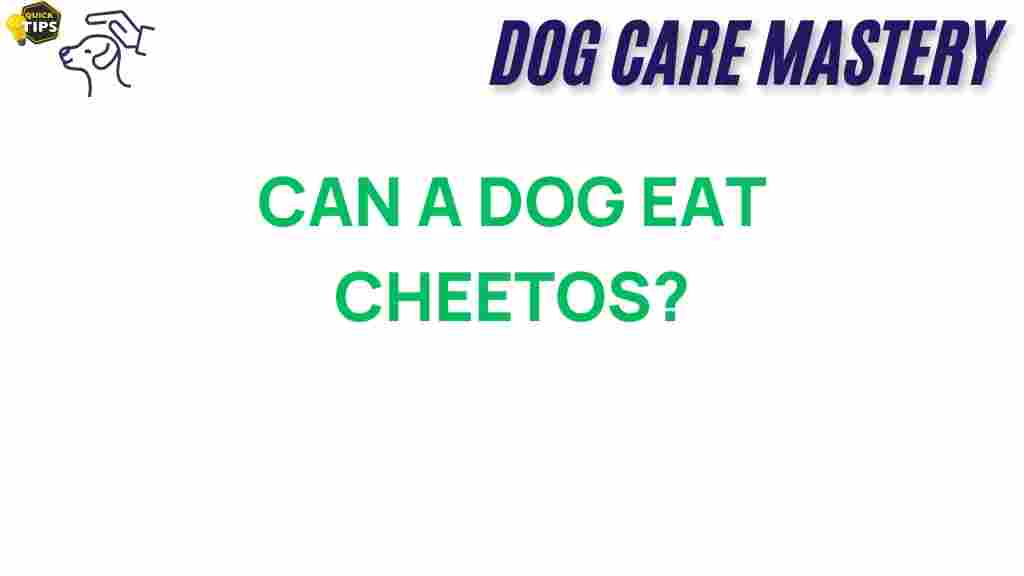Understanding Dog Health: Can a Dog Eat Cheetos Safely?
Cheetos are a beloved snack for many people, but if you have a furry friend at home, you might find yourself wondering if these cheesy puffs are safe for dogs. As dog owners, we constantly strive to ensure our pets maintain optimal dog health. This article will unpack the mystery surrounding Cheetos and dog health, examining whether these snacks are a suitable treat for your four-legged companions.
What Are Cheetos Made Of?
To determine if Cheetos are safe for dogs, it’s crucial to understand their ingredients. Cheetos are typically made from:
- Cornmeal
- Vegetable oil
- Cheddar cheese (and other cheese products)
- Artificial flavors and colors
- Salt
While some of these ingredients are not harmful in small quantities, others can pose risks to your dog’s health.
Potential Risks of Feeding Cheetos to Dogs
When considering the question of whether dogs can eat Cheetos, it’s essential to recognize the potential risks involved:
- High Sodium Content: Cheetos are typically high in salt, which can lead to sodium ion poisoning in dogs. Symptoms include vomiting, diarrhea, excessive thirst, and even seizures in severe cases.
- Artificial Ingredients: Many Cheetos contain artificial flavors and colors that can upset a dog’s stomach or cause an allergic reaction.
- Fat Content: The vegetable oil used in Cheetos can contribute to obesity and pancreatitis in dogs if consumed excessively. High-fat diets can strain your dog’s digestive system.
- Digestive Issues: Cornmeal is not easily digestible for dogs, and consuming too many Cheetos can lead to gastrointestinal distress, including gas and bloating.
Can Dogs Eat Cheetos in Moderation?
The short answer is yes, but with significant caveats. If you decide to share Cheetos with your dog, moderation is critical. Here are some guidelines to follow:
- Limit the quantity: A small piece, once in a while, is less likely to cause problems.
- Monitor for reactions: Always observe your dog after they consume Cheetos for any signs of distress.
- Choose plain Cheetos: Avoid flavored varieties that may contain additional harmful ingredients.
Remember, the goal is to maintain your dog’s health. While a few Cheetos won’t likely harm them, they shouldn’t become a regular part of their diet.
Maintaining Dog Health: Healthier Snack Alternatives
Given the potential risks associated with Cheetos, you might want to consider healthier snack options for your dog. Here are some safe alternatives that can contribute positively to your dog’s dog health:
- Carrots: Crunchy and low in calories, carrots are rich in vitamins and great for your dog’s teeth.
- Apple Slices: Remove the seeds and core, and apples can be a sweet treat loaded with fiber and vitamins.
- Peanut Butter: Most dogs love peanut butter, which is a good source of protein and healthy fats. Just ensure it does not contain xylitol, which is toxic to dogs.
- Sweet Potatoes: Cooked and mashed sweet potatoes are nutritious and can be a tasty snack.
These healthy alternatives can satisfy your dog’s desire for a treat without compromising their dog health.
Understanding Your Dog’s Nutritional Needs
Before introducing any new treats into your dog’s diet, it’s essential to understand their specific nutritional needs. Different breeds, sizes, and ages may require different dietary considerations. Always consult your veterinarian if you are unsure about your dog’s diet or if you’re considering introducing new foods.
Troubleshooting: What to Do If Your Dog Eats Cheetos
If your dog has snuck a handful of Cheetos, don’t panic. Here’s a step-by-step guide on how to handle the situation:
Step 1: Assess the Quantity Consumed
Determine how many Cheetos your dog has eaten. A small amount may not pose a significant threat, but larger quantities can lead to health issues.
Step 2: Monitor for Symptoms
Watch for any signs of distress, including:
- Vomiting
- Diarrhea
- Excessive thirst
- Lethargy
If your dog shows any of these symptoms, it’s time to take action.
Step 3: Contact Your Veterinarian
If your dog exhibits concerning symptoms or you’re uncertain about the quantity consumed, contact your veterinarian immediately. They can provide guidance based on your dog’s specific situation.
Step 4: Keep Track of Future Treats
To prevent future incidents, keep a close eye on the snacks available to your dog. Make sure to store human food out of reach and consider creating a list of safe snacks to offer instead.
Conclusion: Prioritize Your Dog’s Health
In conclusion, while dogs can eat Cheetos in moderation, it’s essential to consider the potential risks associated with these snacks. The high sodium content, artificial ingredients, and fat content can negatively impact your dog’s dog health. Instead of reaching for Cheetos, consider healthier alternatives that can provide your dog with the tasty treats they crave without compromising their well-being.
Ultimately, maintaining a balanced and nutritious diet is crucial for your dog’s overall health. For more tips on ensuring your dog remains healthy and happy, check out our comprehensive guide on dog nutrition. Remember to consult your veterinarian for personalized advice tailored to your dog’s needs.
By prioritizing your dog’s health and safety, you can make informed decisions about their diet and treat them to delicious and nutritious snacks that keep them thriving.
This article is in the category Nutrition and created by dogcaremastery Team
